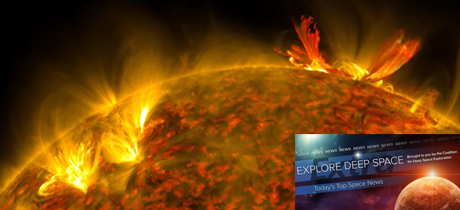In Today’s Deep Space Extra… FCC approves Boeing’s 147-satellite V-band constellation. Earth blasted by a solar flare from the sun.
Space Science
The sun just blasted the Earth with an enormous solar flare: The footage is unreal
Futurism (11/1): Solar activity, which flared up intensely on October 28 is responsible for dazzling displays of the Northern Lights, or aurora, over North America. The sun began its latest 11-year cycle of solar activity in December 2019.
This bizarre ‘superbubble’ spotted by the Hubble Space Telescope has scientists scratching their heads
Space.com (11/3): The image of a vast cloud spotted with the Hubble Space Telescope 170,000 light years from Earth in the Large Magellanic Cloud, a nebula, has astronomers puzzled. The experts have been especially baffled over how a superbubble about 250 light years wide formed.
Other News
FCC approves Boeing’s 147-satellite V-band constellation
Coalition Member in the News – Boeing
SpaceNews.com (11/3): Boeing has received FCC approval to develop and deploy 147 non-geostationary orbit broadband communications satellites. The approval covers the launch of half the constellation within six years and all of the satellites within nine years. Boeing submitted the application to deploy a high-frequency V-band spectrum nearly five years ago, when SpaceX and OneWeb were also seeking permission for their SmallSat constellations. Ryan Reid, who leads Boeing’s commercial satellite programs said in September that the company was still looking for partners for its constellation as it awaited FCC approval.
The United Nations could finally create new rules for space
Wired (11/30): Earlier this week, the U.N. took steps to establish a new working group to advance efforts beyond the 1967 Outer Space Treaty to establish international norms for space operations intended to prevent conflict and hazards such as space debris. The proposal from U.K. diplomats before the U.N.’s First Committee passed overwhelmingly. Under the proposal, a new U.N. working group is to meet twice a year in Geneva in 2022 and 2023 to reach a consensus on new rules and identify issues to investigate further.
French astronaut on Space Station calls for climate change action now
Space.com (11/3): With his current stay aboard the International Space Station (ISS) nearing an end, European Space Agency (ESA) astronaut Thomas Pesquet, the orbital lab’s current commander, called for a united effort to address global climate change concerns. Pesquet, of France, used social media to express his concern earlier this week as the Climate Change Conference in Scotland underway. One of four U.S. Japanese and European astronauts launched to the ISS in April, Pesquet and his crewmates are preparing to return to Earth this month.
Space Force launches ‘Orbital Prime’ program to spur market for on-orbit services
SpaceNews.com (11/4): The U.S. Space Force is kicking off a new initiative to fund commercially developed technologies for orbital operations. The program known as “Orbital Prime” will focus on the emerging market sector known as OSAM, short for on-orbit servicing, assembly, and manufacturing. This includes a broad range of technologies to repair and refuel existing satellites, remove orbital debris and create new capabilities in space.
SpaceFund to invest in navigation system for cislunar space
SpaceNews.com (11/3): The venture investor SpaceFund announced plans on Wednesday to work with Rhea Space Activity to finance the development of an autonomous navigation capability for space missions deployed throughout the region beyond Earth orbit known as cislunar space.

